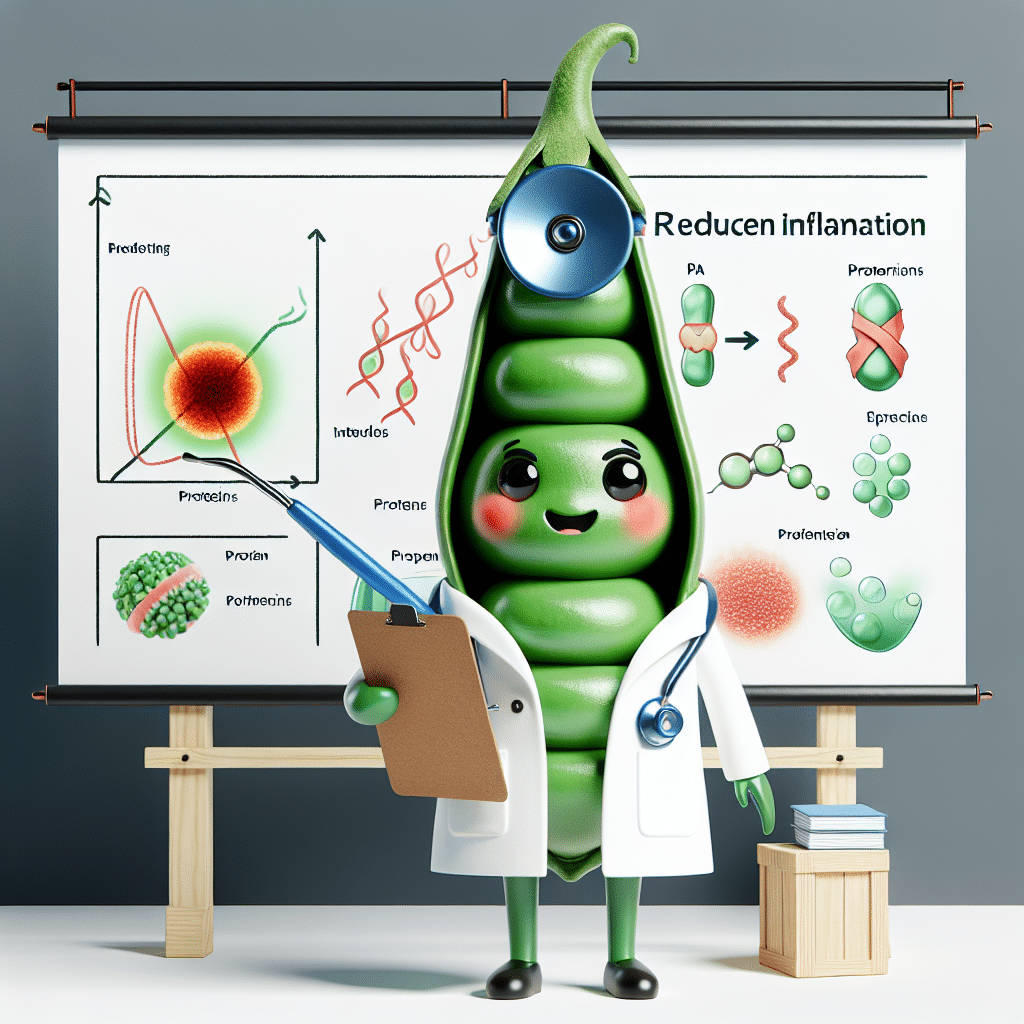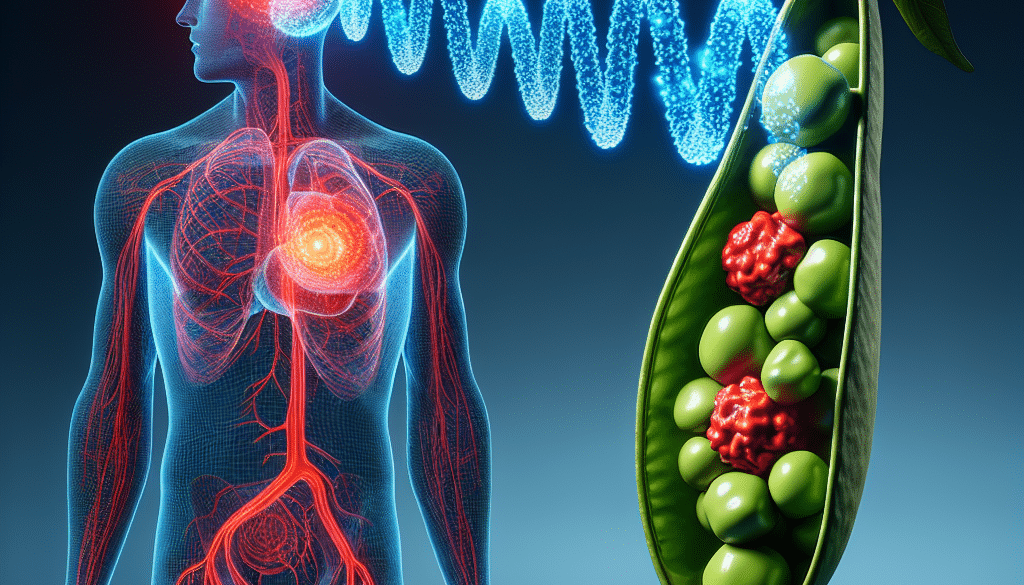Does Pea Protein Reduce Inflammation?
-
Table of Contents
- Pea Protein and Inflammation: Unveiling the Connection
- Understanding Inflammation and Its Impact on Health
- Pea Protein: A Nutritional Overview
- The Anti-Inflammatory Properties of Pea Protein
- Scientific Evidence Supporting Pea Protein’s Role in Reducing Inflammation
- Case Studies and Anecdotal Evidence
- Comparing Pea Protein to Other Protein Sources
- Incorporating Pea Protein into Your Diet
- Conclusion: The Potential of Pea Protein in Reducing Inflammation
- Discover ETprotein’s Premium Pea Protein Products
Pea Protein and Inflammation: Unveiling the Connection

In recent years, pea protein has emerged as a popular plant-based alternative to animal-derived proteins. Its rise in popularity is not only due to its high protein content and suitability for vegans and those with dietary restrictions, but also because of its potential health benefits, including its role in reducing inflammation. This article delves into the scientific evidence behind pea protein’s anti-inflammatory properties and its implications for health and wellness.
Understanding Inflammation and Its Impact on Health
Inflammation is the body’s natural response to injury or infection, a protective mechanism that involves the immune system. However, chronic inflammation can lead to various health issues, including heart disease, diabetes, arthritis, and certain cancers. Therefore, managing inflammation through diet and lifestyle is crucial for maintaining overall health.
Pea Protein: A Nutritional Overview
Pea protein is derived from yellow split peas and is a high-quality source of protein that contains all nine essential amino acids. It is particularly rich in branched-chain amino acids (BCAAs), which are crucial for muscle growth and repair. Additionally, pea protein is hypoallergenic, making it a suitable option for individuals with allergies to dairy, soy, or gluten.
The Anti-Inflammatory Properties of Pea Protein
Several studies have suggested that pea protein may have anti-inflammatory effects. The potential mechanisms behind these effects include:
- Antioxidant Activity: Pea protein contains compounds that exhibit antioxidant properties, which can neutralize free radicals and reduce oxidative stress, a key contributor to inflammation.
- Modulation of Inflammatory Markers: Research indicates that pea protein can influence the production of cytokines and other inflammatory markers, potentially reducing inflammation.
- Positive Impact on Gut Health: Pea protein may promote a healthy gut microbiome, which is closely linked to the body’s inflammatory response.
Scientific Evidence Supporting Pea Protein’s Role in Reducing Inflammation
Several studies have explored the relationship between pea protein consumption and inflammation. For instance:
- A study published in the Journal of Inflammation found that pea protein hydrolysate could reduce inflammation in rats with induced arthritis.
- Another study in the Journal of Agricultural and Food Chemistry reported that peptides derived from pea protein inhibited enzymes involved in the inflammatory process.
- Research in the British Journal of Nutrition suggested that pea protein might help lower blood pressure, a condition often associated with inflammation.
These studies provide promising evidence that pea protein could play a role in managing inflammation, although more research, particularly in humans, is needed to fully understand its effects.
Case Studies and Anecdotal Evidence
While scientific research is essential, anecdotal evidence and case studies also offer insights into pea protein’s anti-inflammatory benefits. Many individuals who have incorporated pea protein into their diets report reduced joint pain and improved recovery after exercise, which may be indicative of its anti-inflammatory effects.
Comparing Pea Protein to Other Protein Sources
When compared to other protein sources, pea protein stands out for its potential anti-inflammatory benefits. Unlike red meat, which has been associated with increased inflammation, pea protein offers a plant-based alternative that may help reduce inflammation. Additionally, it is a more sustainable and environmentally friendly option than many animal-based proteins.
Incorporating Pea Protein into Your Diet
Adding pea protein to your diet is simple and can be done in various ways:
- Protein shakes and smoothies
- Protein bars and snacks
- Meat substitutes in recipes
- Protein-enriched pastas and baked goods
With its versatility and neutral taste, pea protein can easily become a staple in a health-conscious diet.
Conclusion: The Potential of Pea Protein in Reducing Inflammation
In conclusion, the evidence suggests that pea protein may have anti-inflammatory properties that could benefit overall health. While more research is needed, particularly in human trials, the current findings are promising. Pea protein’s high nutritional value, combined with its potential to reduce inflammation, makes it an excellent choice for those looking to improve their diet and manage inflammation.
Discover ETprotein’s Premium Pea Protein Products
If you’re interested in exploring the benefits of pea protein, ETprotein offers a range of high-quality pea protein products. Their organic pea protein is characterized by a neutral taste, non-GMO, and allergen-free attributes, making it an ideal choice for various dietary needs. ETprotein’s commitment to purity and quality ensures that you receive the best product to support your health and wellness goals.
About ETprotein:
ETprotein, a reputable protein and L-(+)-Ergothioneine (EGT) Chinese factory manufacturer and supplier, is renowned for producing, stocking, exporting, and delivering the highest quality organic bulk vegan proteins and L-(+)-Ergothioneine. They include Organic rice protein, clear rice protein, pea protein, clear pea protein, watermelon seed protein, pumpkin seed protein, sunflower seed protein, mung bean protein, peanut protein, and L-(+)-Ergothioneine EGT Pharmaceutical grade, L-(+)-Ergothioneine EGT food grade, L-(+)-Ergothioneine EGT cosmetic grade, L-(+)-Ergothioneine EGT reference grade and L-(+)-Ergothioneine EGT standard. Their offerings, characterized by a neutral taste, non-GMO, allergen-free attributes, with L-(+)-Ergothioneine purity over 98%, 99%, cater to a diverse range of industries. They serve nutraceutical, pharmaceutical, cosmeceutical, veterinary, as well as food and beverage finished product distributors, traders, and manufacturers across Europe, USA, Canada, Australia, Thailand, Japan, Korea, Brazil, and Chile, among others.
ETprotein specialization includes exporting and delivering tailor-made protein powder and finished nutritional supplements. Their extensive product range covers sectors like Food and Beverage, Sports Nutrition, Weight Management, Dietary Supplements, Health and Wellness Products, and Infant Formula, ensuring comprehensive solutions to meet all your protein needs.
As a trusted company by leading global food and beverage brands and Fortune 500 companies, ETprotein reinforces China’s reputation in the global arena. For more information or to sample their products, please contact them and email sales(at)ETprotein.com today.












